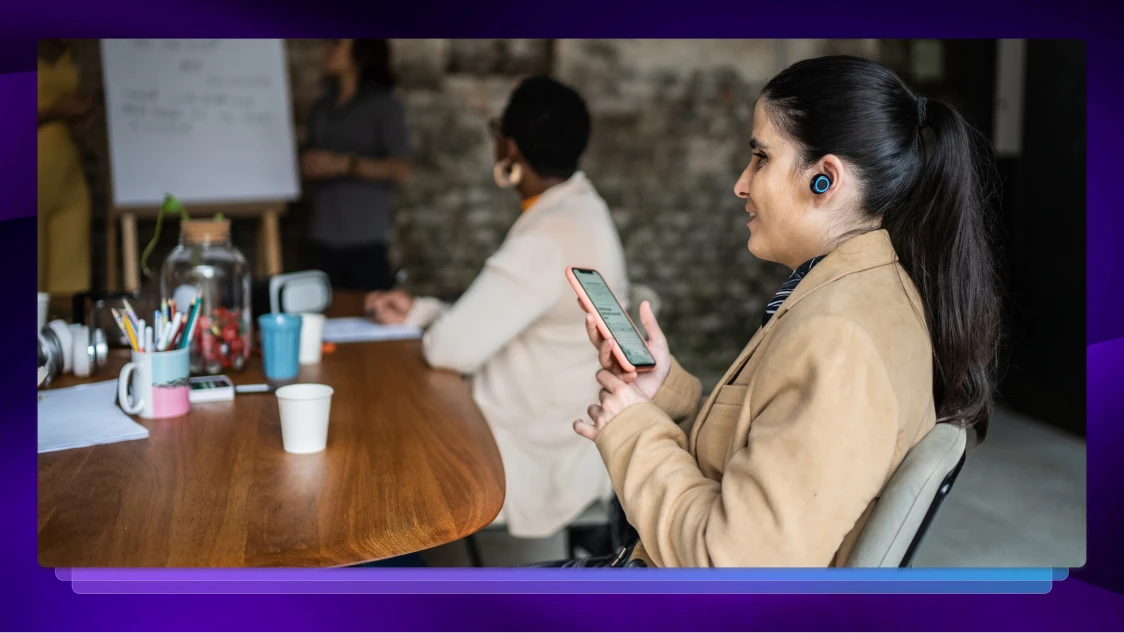Why You Hate the Sound of Your Own Voice (And Tips To Get Used to It)
Do you cringe when you hear your recorded voice? Learn why people often dislike their own voice and get tips to feel more comfortable with how you sound.

Don’t be shocked if you shudder at the sound of your own voice; deep-seated feelings of self-loathing aren’t uncommon post-hitting the replay button. Especially if you’ve started to frequently conduct interviews or produce podcasts needing transcribing, getting used to replaying, rewinding, then replaying again can be a trying task.
Coined in psychology as “voice confrontation,” a host of scientific studies have explored why many people don’t like to hear their own recorded voice. Here, we’ll delve into this research and highlight some useful tips for learning to love your voice.
Or just let someone else transcribe your lovely voice
Exploring the Science Behind Hating Your Voice
When we hear ourselves on an audio recording, we receive this sound via a process known as ‘air conduction’. This is where sound waves cause our eardrums to vibrate, triggering a reaction from our middle ear bones that sends electrical signals straight to our brains.
However, this process directly conflicts with how we learn to hear ourselves speak from the moment we’re born. Known as ‘bone conduction’, much of the sound we create from our vocal cords is transported to our inner ear via the bones in our skulls. Yet we also perceive our voice partially through air conduction, meaning we hear ourselves speak internally and externally at the same time.
In effect, this causes us to wince while listening to our recorded voice as the sound is missing the internal element that we’re so familiar with. This is partly because our bones are better at communicating low-frequency sounds, indicating that our own voice resonates deeper to us than it does to others. Meanwhile, more recent research has discovered that our auditory cortex, which helps us process the sound around us, goes to sleep when we speak. So, while we hear ourselves talk, we don’t actually pay attention to the details.
Adding these reasons together, it starts to make sense why people find their own voice unpleasant. We’re so used to hearing ourselves in a certain way and fail to recognize the imperfections in our speech. This leaves voice recordings feeling like they lack critical information while revealing awkward truths we never realized existed.
However, don’t stress if you think your voice sounds a little weird – only 38% of people immediately recognize their recorded speech. Plus, studies have found that people tend to rate their own voices far more negatively than others do.
Helpful Tips to Learn to Love Your Voice
Getting used to your voice might seem like a daunting prospect. But there are some helpful techniques you can learn to ensure you cringe less when you listen to your next recording.
Analyze your recordings
As voice recordings spotlight the gap between how we perceive our voice and what it actually sounds like, deliberately listening to and analyzing these recordings could prove valuable. Due to the mere-exposure effect, where we learn to prefer things we’re familiar with, the act of listening to your voice should help you get used to its quirks and features.
Drop the formality
Everyone wants to express themselves with detail and accuracy. But using too many complex terms might mean your recording becomes dry and convoluted. Instead, focus on speaking naturally by using the kinds of words you’d use in your everyday conversation. Even if you’re the only one listening, a less long-winded approach might save you from flinching at the sound of your voice.
Slow down
Similarly, rushing through a script is a surefire way to feel uncomfortable with your voice. This often happens when there’s too much information to convey, causing you to hasten your speed to cut down the length of your content. Try your best to resist this temptation, as getting used to your true speaking voice requires you to speak in your normal cadence.
Choose substance over sound
As the research suggests, there’s a good chance that you’re considerably more concerned about the sound of your voice than anyone else. To help distract yourself from the occasional mispronunciation or stutter, craft a powerful message that inspires your audience. Rather than remaining acutely aware of how your voice sounds, your emphatic address will be too good to ignore.
Outsource Your Audio and Video Transcription
If listening to the sound of your voice is holding you back, alternatives exist that can save you from yourself. For instance, you can outsource your audio and video transcription work to a professional transcription service like Rev. This sanity-saving measure involves just three simple steps.
First, upload your audio and choose between a human transcriber or an automatic speech recognition service. Next, customize your transcription by making it a rush job or adding timestamps. Finally, download the error-free transcript straight from your inbox.















